democracynow.org
Stories:
Could the Presidential Election Be Hacked? FBI "Flash" Alert Urges States to Bolster Security




Brazil: President Dilma Rousseff Takes Stand at Impeachment Trial
 In Brazil, suspended President Dilma Rousseff took the stand Monday and denounced her impeachment trial as a coup.
In Brazil, suspended President Dilma Rousseff took the stand Monday and denounced her impeachment trial as a coup.
President Dilma Rousseff: "Without an impeachable crime, any impeachment carried out by Brazilian lawmakers is a clear attack on the Constitution, because the Constitution clearly sets out the necessity for impeachment processes on the basis of a crime. An impeachment process which commits the violent act of removing an innocent president is a coup d’état."
During her testimony, Rousseff also compared the impeachment proceedings to Brazil’s dictatorship-era military tribunals that sentenced her to prison for her activism against the regime. She was tortured while imprisoned. Despite her impassioned testimony, Brazil’s Senate is expected to vote to remove Rousseff as early as Wednesday.
Following DOJ Decision, DHS to Review Private Prison Contracts
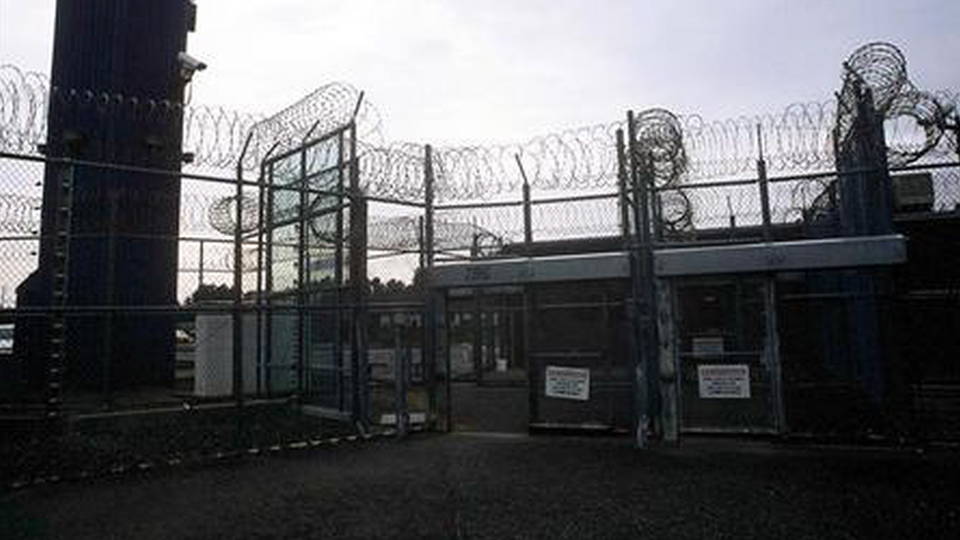 In the United States, Department of Homeland Security Secretary Jeh Johnson has ordered DHS review its contracts with for-profit prison companies. This comes after the Justice Department told the Bureau of Prisons to end its use of private prisons earlier this month. DHS oversees a network of immigrant detention centers. About 34,000 immigrants are currently being held in for-profit detention centers. Human rights activists and some lawmakers celebrated the announcement. Arizona Congressmember Raúl Grijalva said, "This step is a tacit admission that the corporations who profit by locking up desperate adults and children undermine our decency as a nation." As with the Justice Department’s announcement two weeks ago, the DHS move caused the plunge of stocks for GEO Group and Corrections Corporations of America, two of the largest for-profit prison operators.
In the United States, Department of Homeland Security Secretary Jeh Johnson has ordered DHS review its contracts with for-profit prison companies. This comes after the Justice Department told the Bureau of Prisons to end its use of private prisons earlier this month. DHS oversees a network of immigrant detention centers. About 34,000 immigrants are currently being held in for-profit detention centers. Human rights activists and some lawmakers celebrated the announcement. Arizona Congressmember Raúl Grijalva said, "This step is a tacit admission that the corporations who profit by locking up desperate adults and children undermine our decency as a nation." As with the Justice Department’s announcement two weeks ago, the DHS move caused the plunge of stocks for GEO Group and Corrections Corporations of America, two of the largest for-profit prison operators.
Incarcerated People Across U.S. Prepare for Sept. 9 Prison Strike
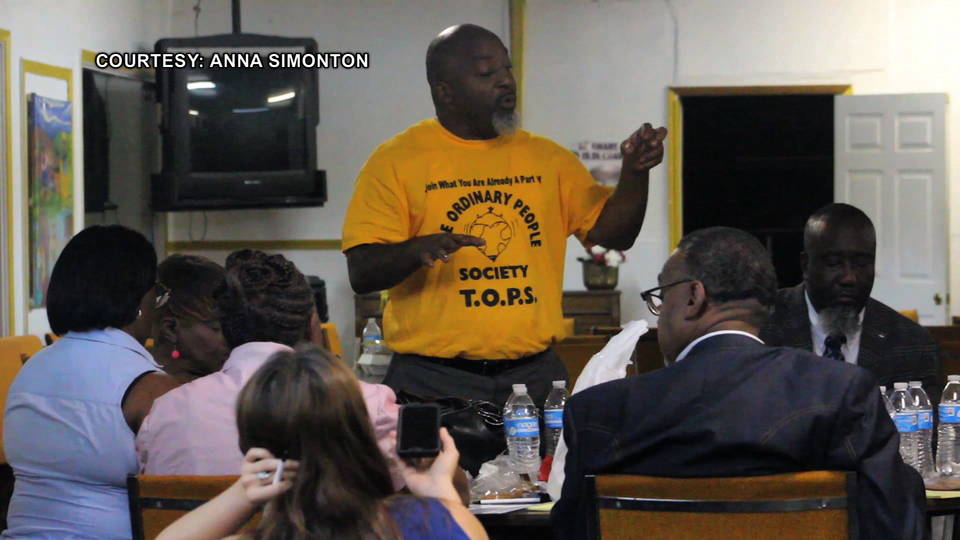 This comes as incarcerated people in prisons across the United States are gearing up for a prison strike on September 9, which is the 45th anniversary of the Attica prison uprising. Organizers say this year’s strike could be one of the largest prison strikes in recent history. On Friday, about 50 formerly incarcerated people and family members of currently incarcerated people from across Alabama and Georgia gathered in Dothan, Alabama, to organize support for the strike. This is Kenneth Glasgow of the Free Alabama Movement.
This comes as incarcerated people in prisons across the United States are gearing up for a prison strike on September 9, which is the 45th anniversary of the Attica prison uprising. Organizers say this year’s strike could be one of the largest prison strikes in recent history. On Friday, about 50 formerly incarcerated people and family members of currently incarcerated people from across Alabama and Georgia gathered in Dothan, Alabama, to organize support for the strike. This is Kenneth Glasgow of the Free Alabama Movement.
Kenneth Glasgow: "Twenty-four different states, about 40 to 50 different prisons that was organized by the Free Alabama Movement to end prison slavery. We found out, by law, that those that are incarcerated, in prison, still have the rights to assemble, the rights to a prison strike, if it’s peaceful, and the rights not to be retaliated against. So those are things that we’ll be pushing."
David Duke Endorses Donald Trump in New Louisiana Robocall
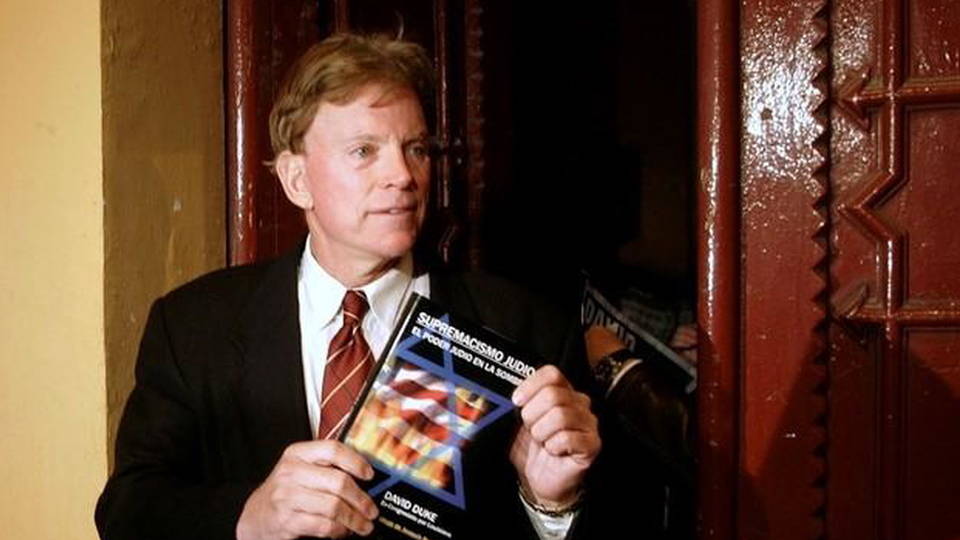 In news from the campaign trail, Donald Trump is again facing criticism over his campaign’s ties to white supremacists, after a new robocall from former Ku Klux Klan leader David Duke urges Louisiana voters to vote for him for Senate and Donald Trump for president.
In news from the campaign trail, Donald Trump is again facing criticism over his campaign’s ties to white supremacists, after a new robocall from former Ku Klux Klan leader David Duke urges Louisiana voters to vote for him for Senate and Donald Trump for president.
David Duke: "Unless massive immigration is stopped now, we’ll be outnumbered and outvoted in our own nation. It’s happening. We’re losing our gun rights, our free speech. We’re taxed to death. We’re losing our jobs and businesses to unfair trade. We’re losing our country. Look at the Super Bowl salute to the Black Panther cop killers. It’s time to stand up and vote for Donald Trump for president and vote for me, David Duke, for the U.S. Senate."
Trump has faced criticism in the past for initially refusing to disavow David Duke’s endorsement, although Trump and his campaign have since repeatedly disavowed Duke—including after BuzzFeed published audio of the robocall on Monday.
Trump Surrogate Tweets Image of Clinton in Blackface
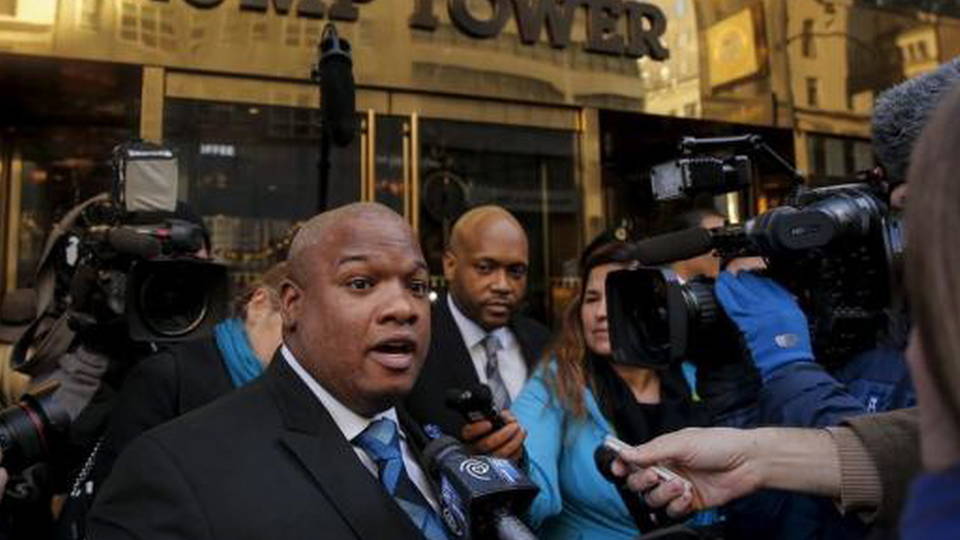 Donald Trump’s campaign is also facing controversy after one of his surrogates tweeted an image of Hillary Clinton in blackface. Pastor Mark Burns is Donald Trump’s top African-American adviser. He tweeted the image on Monday, which depicts Hillary Clinton in blackface and wearing a T-shirt that reads "No Hot Sauce, No Peace." Burns also tweeted, "Black Americans, THANK YOU FOR YOUR VOTES and letting me use you again... See you again in 4 years." Burns later deleted the tweet, saying, "I regret the offensiveness of the black face." Meanwhile, Donald Trump has denounced NFL 49ers quarterback Colin Kaepernick for refusing to stand during the national anthem in a protest against police brutality and in solidarity with the Black Lives Matter movement. Trump called the protest "terrible" and said "maybe he should find a country that works better for him."
Donald Trump’s campaign is also facing controversy after one of his surrogates tweeted an image of Hillary Clinton in blackface. Pastor Mark Burns is Donald Trump’s top African-American adviser. He tweeted the image on Monday, which depicts Hillary Clinton in blackface and wearing a T-shirt that reads "No Hot Sauce, No Peace." Burns also tweeted, "Black Americans, THANK YOU FOR YOUR VOTES and letting me use you again... See you again in 4 years." Burns later deleted the tweet, saying, "I regret the offensiveness of the black face." Meanwhile, Donald Trump has denounced NFL 49ers quarterback Colin Kaepernick for refusing to stand during the national anthem in a protest against police brutality and in solidarity with the Black Lives Matter movement. Trump called the protest "terrible" and said "maybe he should find a country that works better for him."
Abedin and Weiner to Separate, After New Sexting Scandal
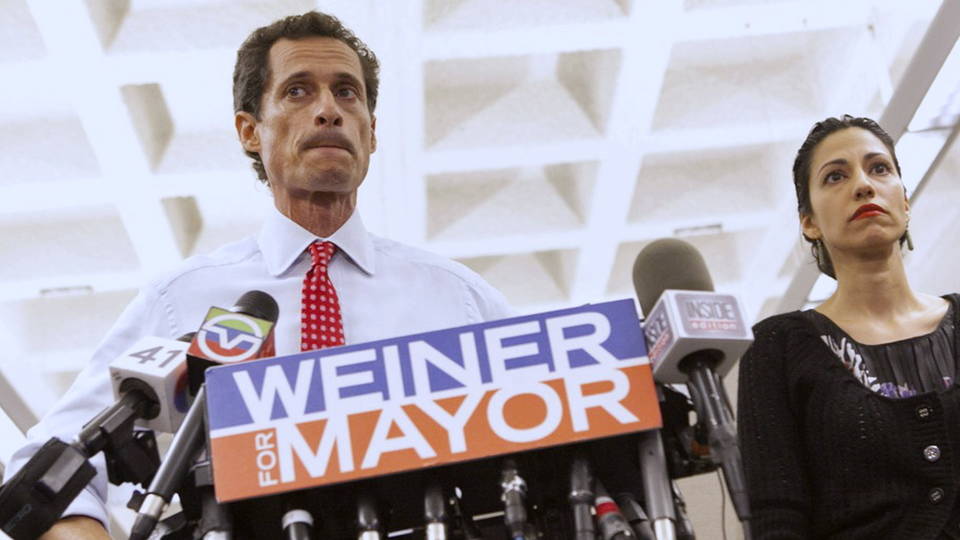 Hillary Clinton’s top aide Huma Abedin has announced she’s separating from her husband, former New York Congressmember Anthony Weiner, after photos and reports surfaced of Weiner again sending sexual text messages. Weiner stepped down from Congress in 2011 after initially lying to the public about explicit phone and internet contact with six women he met online.
Hillary Clinton’s top aide Huma Abedin has announced she’s separating from her husband, former New York Congressmember Anthony Weiner, after photos and reports surfaced of Weiner again sending sexual text messages. Weiner stepped down from Congress in 2011 after initially lying to the public about explicit phone and internet contact with six women he met online.
New York Times: Clinton Foundation Symbol of "Tangled Alliances"
 Meanwhile, Huma Abedin and Hillary Clinton are facing increasing questions about how Abedin was simultaneously paid by the Clinton Foundation, the State Department and the global consulting firm Teneo, which is run by Doug Band, who helped start the Clinton Foundation. Abedin has also been at the center of questions after the release of emails showing the close ties between the Clinton Foundation and the State Department during Hillary Clinton’s time as secretary of state. On Monday, The New York Times editorial board called on Clinton to distance herself from the foundation as an "ethical imperative," writing, "The Clinton Foundation has become a symbol of the Clintons’ laudable ambitions, but also of their tangled alliances and operational opacity."
Meanwhile, Huma Abedin and Hillary Clinton are facing increasing questions about how Abedin was simultaneously paid by the Clinton Foundation, the State Department and the global consulting firm Teneo, which is run by Doug Band, who helped start the Clinton Foundation. Abedin has also been at the center of questions after the release of emails showing the close ties between the Clinton Foundation and the State Department during Hillary Clinton’s time as secretary of state. On Monday, The New York Times editorial board called on Clinton to distance herself from the foundation as an "ethical imperative," writing, "The Clinton Foundation has become a symbol of the Clintons’ laudable ambitions, but also of their tangled alliances and operational opacity."
McCain & Wasserman Schultz Faces Primary Races Today
 In local election news, Arizona Senator John McCain and Florida Congressmember Debbie Wasserman Schultz have their primaries today. McCain is up against Dr. Kelli Ward, a little-known Arizona state senator. Wasserman Schultz is the former chair of the Democratic National Committee. She stepped down after WikiLeaks released nearly 20,000 emails revealing how the Democratic Party favored Hillary Clinton and worked behind the scenes to discredit and defeat Bernie Sanders. Sanders has backed Wasserman Schultz’s opponent, Tim Canova, in the primary race, although some say Sanders has not done enough to support Canova.
In local election news, Arizona Senator John McCain and Florida Congressmember Debbie Wasserman Schultz have their primaries today. McCain is up against Dr. Kelli Ward, a little-known Arizona state senator. Wasserman Schultz is the former chair of the Democratic National Committee. She stepped down after WikiLeaks released nearly 20,000 emails revealing how the Democratic Party favored Hillary Clinton and worked behind the scenes to discredit and defeat Bernie Sanders. Sanders has backed Wasserman Schultz’s opponent, Tim Canova, in the primary race, although some say Sanders has not done enough to support Canova.
U.S. Has Resettled 10,000 Syrians, 0.2% of Syrians Displaced Worldwide
 The White House says it has met its goal of resettling 10,000 Syrian refugees this year. That’s only about 0.2 percent of the total number of Syrian refugees registered with the United Nations. Many human rights organizations are calling on the U.S. to accept more Syrians. On Monday, Amnesty International wrote, "So many are still trapped in horrific conditions in refugee camps or war zones. The U.S. must do more." Nearly 5 million Syrians are currently displaced outside of their country.
The White House says it has met its goal of resettling 10,000 Syrian refugees this year. That’s only about 0.2 percent of the total number of Syrian refugees registered with the United Nations. Many human rights organizations are calling on the U.S. to accept more Syrians. On Monday, Amnesty International wrote, "So many are still trapped in horrific conditions in refugee camps or war zones. The U.S. must do more." Nearly 5 million Syrians are currently displaced outside of their country.
Italian Coast Guard: 6,500 Refugees Rescued Monday
 This comes as the Italian Coast Guard says about 6,500 refugees were rescued off the coast of Libya on Monday alone. Most of the refugees were reportedly from Eritrea and Somalia.
This comes as the Italian Coast Guard says about 6,500 refugees were rescued off the coast of Libya on Monday alone. Most of the refugees were reportedly from Eritrea and Somalia.
ND: Hundreds Protest Law Firm Defending Dakota Access Pipeline
 In Bismarck, North Dakota, hundreds of people protested Monday outside the offices of the law firm Fredrikson & Byron P.A., which is representing Dakota Access LLC—the company behind the $3.8 billion oil pipeline that has faced massive resistance from the Standing Rock Sioux Tribe and other tribal nations. This is Tom Goldtooth, director of the Indigenous Environmental Network.
In Bismarck, North Dakota, hundreds of people protested Monday outside the offices of the law firm Fredrikson & Byron P.A., which is representing Dakota Access LLC—the company behind the $3.8 billion oil pipeline that has faced massive resistance from the Standing Rock Sioux Tribe and other tribal nations. This is Tom Goldtooth, director of the Indigenous Environmental Network.
Tom Goldtooth: "We are part of a growing movement that is condemning this colonial legal system based upon property rights."
Black Lives Matter Delegation Returns from Standing Rock Camp
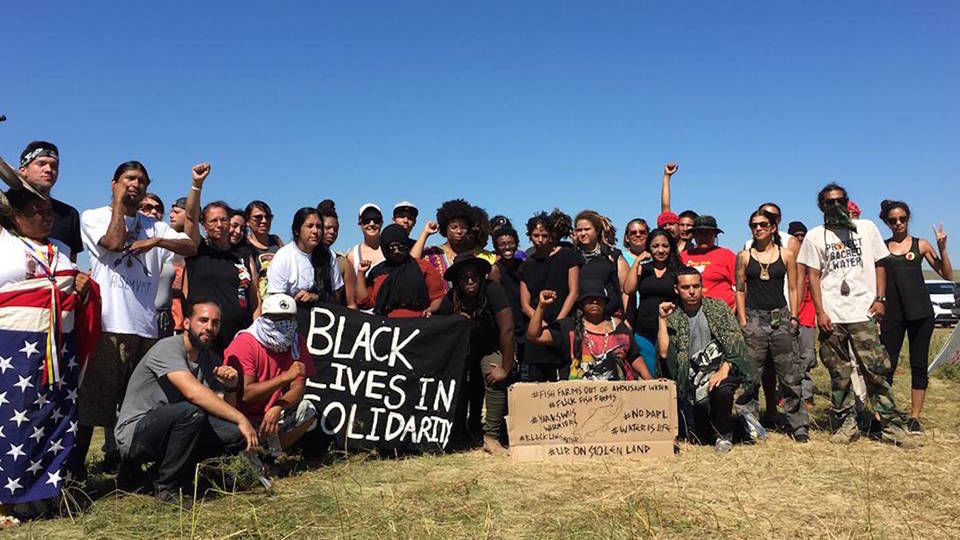 Members of nearly 100 tribal nations from across the United States and Canada have arrived at the ongoing Sacred Stone Spirit Camp, which is blocking the construction of the 1,172-mile pipeline that would transport 500,000 barrels of Bakken oil from North Dakota to Illinois. Among those who have traveled to Standing Rock is a delegation from Black Lives Matter. This is Janaya Khan, co-founder of Black Lives Matter Toronto, speaking as they filmed the construction site.
Members of nearly 100 tribal nations from across the United States and Canada have arrived at the ongoing Sacred Stone Spirit Camp, which is blocking the construction of the 1,172-mile pipeline that would transport 500,000 barrels of Bakken oil from North Dakota to Illinois. Among those who have traveled to Standing Rock is a delegation from Black Lives Matter. This is Janaya Khan, co-founder of Black Lives Matter Toronto, speaking as they filmed the construction site.
Janaya Khan: "Here we are at Standing Rock at the site of resistance. We were invited, and, by the grace of the creator, we’re here channeling Black Lives Matter on indigenous land, following indigenous and native leadership."
Report: More Than 2 Dozen Banks Financing Dakota Access Pipeline
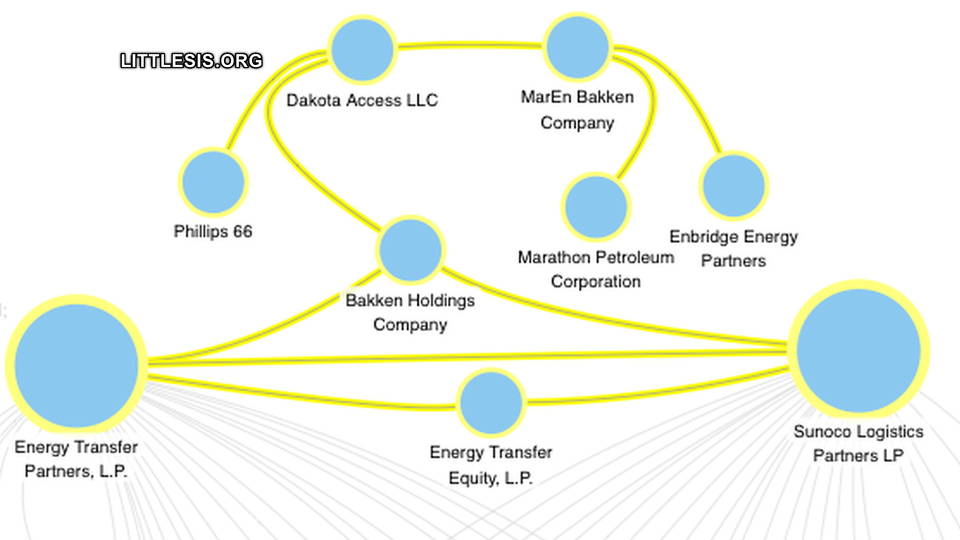 This comes as a new investigation has revealed that more than two dozen major banks and financial institutions are helping finance the Dakota Access pipeline. The investigation was published by the research outlet LittleSis. It details how Bank of America, HSBC, UBS, Goldman Sachs, Wells Fargo, JPMorgan Chase and other financial institutions have, combined, extended a $3.75 billion credit line to Energy Transfer, the parent company of Dakota Access LLC.
This comes as a new investigation has revealed that more than two dozen major banks and financial institutions are helping finance the Dakota Access pipeline. The investigation was published by the research outlet LittleSis. It details how Bank of America, HSBC, UBS, Goldman Sachs, Wells Fargo, JPMorgan Chase and other financial institutions have, combined, extended a $3.75 billion credit line to Energy Transfer, the parent company of Dakota Access LLC.
10 People Arrested Protesting Spectra Pipelines in MA and NY
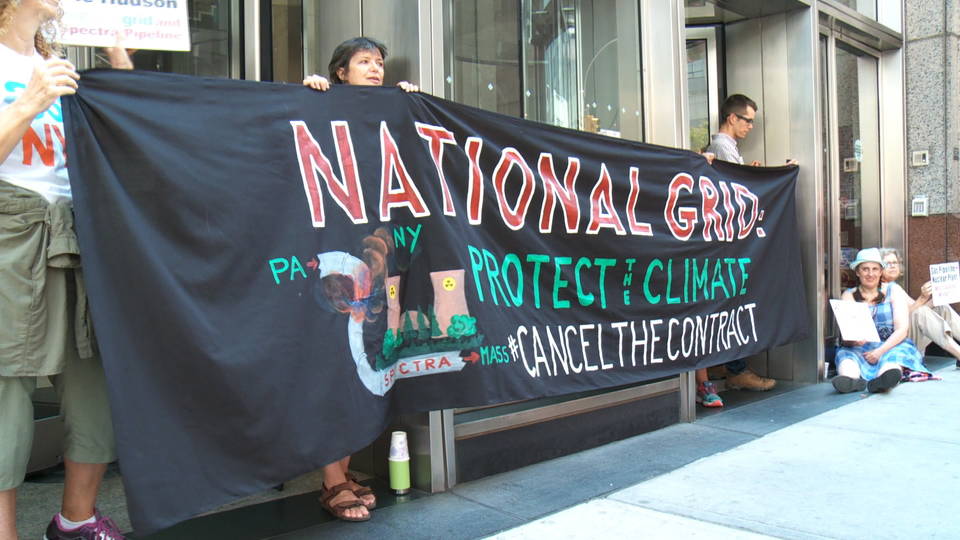 Meanwhile, protests are also continuing against oil and gas pipelines in the Eastern United States. On Monday, two activists were arrested in West Roxbury, Massachusetts, after they locked themselves to cars to protest the construction of the Spectra Energy gas pipeline. In New York City, eight people were arrested blockading the doors of National Grid to protest the electric company’s support for the Spectra Energy’s AIM pipeline, which is slated to run only hundreds of feet from the aging Indian Point nuclear power plant. This is Alexandra Zevin speaking to Democracy Now! as she is getting arrested.
Meanwhile, protests are also continuing against oil and gas pipelines in the Eastern United States. On Monday, two activists were arrested in West Roxbury, Massachusetts, after they locked themselves to cars to protest the construction of the Spectra Energy gas pipeline. In New York City, eight people were arrested blockading the doors of National Grid to protest the electric company’s support for the Spectra Energy’s AIM pipeline, which is slated to run only hundreds of feet from the aging Indian Point nuclear power plant. This is Alexandra Zevin speaking to Democracy Now! as she is getting arrested.
Alexandra Zevin: "We’re worried about the dangers of the pipelines, especially near the nuclear power plant, which is ridiculous. Why should New York state residents take all the risk, and that corporation go off with all the money? It’s ridiculous. We need solar energy. We need wind power."
The growing protests against oil and gas pipelines come as NASA’s top climate scientist, Gavin Schmidt, is warning the Earth is warming at an "exceptional" rate that is "unprecedented in 1,000 years."
Colorado: 2 Anti-Fracking Ballot Initiatives Fail
 In Colorado, an effort to place two anti-fracking measures on the ballot in November has failed to secure enough votes. One measure would have given local communities the power to ban oil and gas projects. The other would have imposed a mandatory 2,500-foot distance between oil and gas projects and schools, playgrounds and hospitals. Organizers of the ballot initiatives say they were outspent 35 to 1 by a pro-oil campaign funded by the oil and gas industry.
In Colorado, an effort to place two anti-fracking measures on the ballot in November has failed to secure enough votes. One measure would have given local communities the power to ban oil and gas projects. The other would have imposed a mandatory 2,500-foot distance between oil and gas projects and schools, playgrounds and hospitals. Organizers of the ballot initiatives say they were outspent 35 to 1 by a pro-oil campaign funded by the oil and gas industry.
CA Passes Brock Turner-Inspired Law; Turner Set to Be Freed Friday
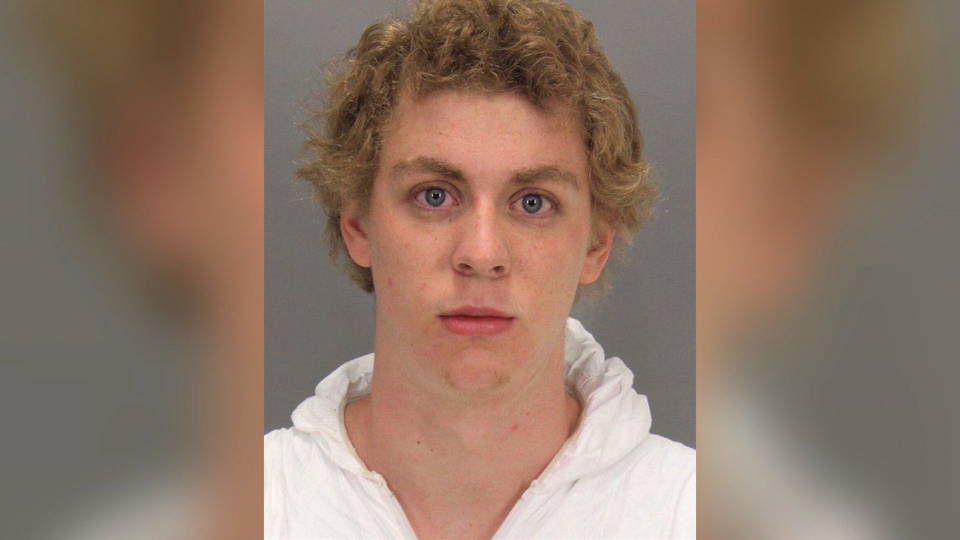 California lawmakers voted Monday to pass a law requiring prison time for those convicted of sexually assaulting an unconscious victim. This comes in the wake of California Judge Aaron Persky’s decision to sentence Stanford University swimmer Brock Turner to a six-month prison term for sexually assaulting an unconscious woman behind a dumpster. Judge Persky said he was concerned a longer prison sentence would have a "severe impact" on Turner. Following outrage over this sentence, Persky has removed himself from hearing criminal cases. Turner is set to be released from Santa Clara jail on Friday, after serving only half of his sentence.
California lawmakers voted Monday to pass a law requiring prison time for those convicted of sexually assaulting an unconscious victim. This comes in the wake of California Judge Aaron Persky’s decision to sentence Stanford University swimmer Brock Turner to a six-month prison term for sexually assaulting an unconscious woman behind a dumpster. Judge Persky said he was concerned a longer prison sentence would have a "severe impact" on Turner. Following outrage over this sentence, Persky has removed himself from hearing criminal cases. Turner is set to be released from Santa Clara jail on Friday, after serving only half of his sentence.
Puerto Rico: 6 Arrested Protesting Pro-PROMESA Media Coverage
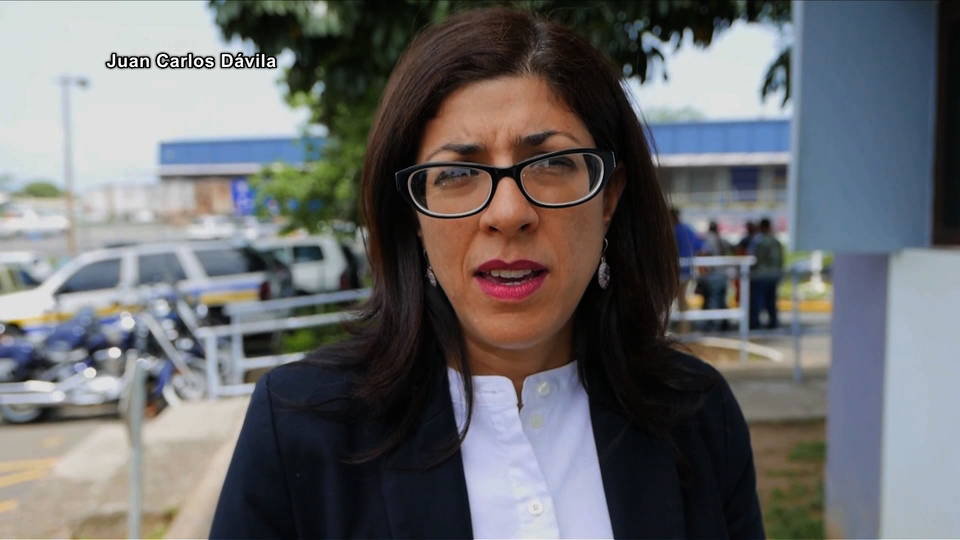 And in Puerto Rico, six people were arrested for blocking the entrance of GFR Media, which owns three of the Puerto Rico’s top newspapers. Protesters say the media company’s coverage has been unfairly favorable to the PROMESA law, which was passed by the U.S. Congress in June, establishing a federally appointed control board with sweeping powers to run Puerto Rico’s economy. This is Mariana Nogales, a lawyer representing the arrested activists.
And in Puerto Rico, six people were arrested for blocking the entrance of GFR Media, which owns three of the Puerto Rico’s top newspapers. Protesters say the media company’s coverage has been unfairly favorable to the PROMESA law, which was passed by the U.S. Congress in June, establishing a federally appointed control board with sweeping powers to run Puerto Rico’s economy. This is Mariana Nogales, a lawyer representing the arrested activists.
Mariana Nogales Molinelli: "My name is Mariana Nogales Molinelli, and I’m a lawyer. We are here because they have arrested people for protesting against GFR Media and El Nuevo Día because of their support for the Fiscal Control Board, which these media outlets have been making since the beginning. For a moment, some media outlets did express that the PROMESA law was not a good law for Puerto Rico. However, the editorial line has now changed completely to be in favor of the control board. This is the first time that they have made arrests and detained people for protesting against the control board and against groups and corporations such as GFRMedia, which have expressed support for the control board."
-------
Donate today:
Follow:



WEB EXCLUSIVE
 Senior TV Producer
Senior TV Producer
207 West 25th Street, 11th Floor

Hackers based outside the United States have reportedly infiltrated two state election databases, raising fresh concerns about cybersecurity in the lead-up to the presidential elections. According to a new investigation by Yahoo News, FBI’s Cyber Division released a "flash" alert earlier this month and warned election officials across the nation to take new measures to bolster the security of their computer systems. Sources familiar with the document told Yahoo News that Arizona and Illinois were the two states compromised by the hacks. The Illinois hack reportedly caused more damage, forcing officials to shut down the voter registration system for 10 days in July after the hackers managed to download personal data on up to 200,000 state voters. We speak to Michael Isikoff., chief investigative correspondent for Yahoo News.
TRANSCRIPT
This is a rush transcript. Copy may not be in its final form.
AMY GOODMAN: This is Democracy Now!, democracynow.org, The War and Peace Report. I’m Amy Goodman. Hackers based outside the United States have reportedly infiltrated two state election databases, raising fresh concerns about cybersecurity in the lead-up to the presidential elections. This is according to a new investigation by Yahoo News. FBI’s Cyber Division released a "flash" alert earlier this month and warned election officials across the country to take new measures to bolster the security of their computer systems. Sources familiar with the document told Yahoo News that Arizona and Illinois were the two states compromised by the hacks. The Illinois hack reportedly caused more damage, forcing officials to shut down the voter registration system for 10 days in July after the hackers managed to download personal data on up to 200,000 state voters.
For more, we go to D.C. to the man behind the investigation, Michael Isikoff, chief investigative correspondent for Yahoo News. His new piece is headlined "FBI Says Foreign Hackers Penetrated State Election Systems."
Michael, thanks for joining us again. Explain what you found.
MICHAEL ISIKOFF: Sure. Well, look, this whole issue of potential hacking of the election has gotten a lot of attention because of the hack of the Democratic National Committee and other political organizations in Washington that U.S. officials believe was committed by Russian intelligence. That raised the concern that the Russians, if indeed they did what U.S. officials believe they did, won’t stop there, and they might seek to tamper with the election itself.
Now, that would not be an easy thing to do. In 40 states, we have optical scan voting, in which there are backup of paper ballots, so there’s a safety net there. But there are points of vulnerability. In six states and parts of four others, including Pennsylvania, a crucial swing state, there are electronic voting machines, that are vulnerable, that could be tampered with. There’s internet voting for overseas ballots and military ballots in 33 states, so that’s another point of vulnerability.
All this prompted Jeh Johnson, homeland security secretary, to have a conference call with state election officials on August 15th and advise them, "Here are steps we think you should take. This is an area of concern." And then, as we report in this piece, three days later, the FBI sent a confidential warning to state election officials, saying that they were investigating penetrations of two states. They don’t refer to—they don’t name them in the piece, but we did—in the alert, but we did report they’re Arizona and Illinois.
In the case of Illinois, hackers, believed to be foreign, penetrated the election voter database and exfiltrated, stole data on about 200,000 voters. So, we don’t know at this point whether that is linked to the Democratic National Committee hacking. It’s something the FBI is investigating, although this just as easily could have been common cybercriminals doing this for fraud purposes. But it has raised the concerns to new levels that this is something that state election officials have to take a lot more seriously, and federal officials, as well.
AMY GOODMAN: What are these states? You mentioned six states and parts of four others use these DREs, or direct recording electronic voting machines, which have no paper backup.
MICHAEL ISIKOFF: Yeah. Well, the two that would be of particular concern, because they’re swing states in the election, is Pennsylvania and Virginia. Some of the others—Tennessee—are, you know, probably pretty locked in on who they’re going to vote for. But I can tell you that this is being taken seriously in those states. I talked to Pennsylvania officials for this piece. They’re very aware of these vulnerabilities. I mean, one thing—you know, one obvious step is to make sure the machines are not connected to the internet, you know, in and around the time of voting, but at some point they have to be turned on, and, you know, they do have to be connected. And that’s—you know, a sophisticated hacker could theoretically get in and somehow tamper with the tabulations.
AMY GOODMAN: So, Michael, you have the FBI saying they’ve uncovered evidence that foreign hackers penetrated two state election systems. But, of course, it doesn’t just have to be foreign hackers.
MICHAEL ISIKOFF: Right, it could be anybody. And, look, there is, you know, the—on both sides, there is heightened awareness and concern about this. You have Donald Trump talking about rigged elections. And then, on the other hand, you have Democrats, like Harry Reid, who wrote a letter to FBI Director Comey yesterday, after my piece, raising concerns about Russian tampering. And given associations that people in the Trump campaign have had with Russia—Paul Manafort, of course, was in business with pro-Putin oligarchs; Mike Flynn, the general, retired general, had flown over to Moscow for the 10th anniversary celebration of RT and was paid for it—so there’s been multiple—
AMY GOODMAN: An adviser to Donald Trump.
MICHAEL ISIKOFF: —allegations. Yeah.
AMY GOODMAN: And you have Donald Trump talking about rigged elections. On the other hand, what was your response to him calling on Russia to hack Hillary Clinton’s emails?
MICHAEL ISIKOFF: Yeah, well, clearly, that got a lot of attention and seemed way over the top. Of course, he said he was only being sarcastic and shouldn’t be taken seriously. But I think, look, you know, is—can the Russians actually launch a full-scale cyber-attack and influence the election? You know, probably not. As I mentioned, there are points of vulnerability, but it would take a lot, given that elections are state and local affairs, and there’s a lot of points of entry, and it would be a huge undertaking. But even if they could do it—
AMY GOODMAN: Three seconds.
MICHAEL ISIKOFF: —a little bit, do something like what they did, like the tampering with election—
AMY GOODMAN: Michael Isikoff, we’re going to have to leave it there, chief investigative correspondent for Yahoo News. ... Read More →

In 2007, the wholesale price of the EpiPen in the U.S. was $57. Less than a decade later, the life-saving drug now costs over $300. Each EpiPen reportedly contains only $1 worth of medicine. Mylan has a near monopoly in the U.S., and the company has seen its profits from the EpiPen alone skyrocket to $1 billion a year. Meanwhile, Mylan CEO Heather Bresch’s total compensation has spiked from around $2.5 million in 2007 to almost $19 million today. In response to the price hikes, the consumer advocacy group Public Citizen and its allies will deliver a petition signed by approximately 600,000 people to Mylan’s headquarters in Canonsburg, Pennsylvania, today demanding further price cuts. For more, we speak with Peter Maybarduk, director of Public Citizen’s Global Access to Medicines Program.
TRANSCRIPT
This is a rush transcript. Copy may not be in its final form.
AMY GOODMAN: Peter Maybarduk, explain exactly what has happened here. Explain what the price increase was and how people are organizing now. What is Heather Bresch explaining here?
PETER MAYBARDUK: Well, the drug companies want to point fingers at the insurers, and the insurers want to point fingers at the drug companies. But it’s all convoluted mechanisms to avoid plain talk about price. This is a 100-year-old drug in a 40-year-old injection technology that was invented in connection with Department of Defense projects, meaning that taxpayers already paid for a considerable amount of the research associated with this—with this product. It hit the market. When Mylan acquired the rights, the product cost $100. Now it’s up to $600. The increases in EpiPen prices have more or less tracked the increases in the Mylan CEO’s pay, executive compensation, over that period of time. There haven’t been significant improvements to that product, as was mentioned, in the time, so we’re not paying for—we’re not paying for innovation. We’re paying for price gouging. We’re paying for Mylan’s shameful greed.
And today, Public Citizen will deliver—I think the number is increasing—closer to 1 million signatures, hopefully, if you help us out, to Mylan’s corporate headquarters outside Pittsburgh, demanding that that price be reduced. In other words, we can talk—Mylan wants to talk about coupons and patient assistance programs and this new, absolutely bizarre move of introducing a generic version of its essentially generic own product. And—but what—the one thing it won’t do, the one thing Mylan refuses to do, is have plain talk about price and just reduce the price. That would be the simplest, most effective thing to do to ensure that everyone who needs an EpiPen can get one and that the cost burden that we all share, paying into our healthcare system, is reduced.
AMY GOODMAN: Can you explain that further, what they have done, as opposed to just reducing the price?
PETER MAYBARDUK: Well, yesterday, Mylan announced that it was going to introduce what it called a generic EpiPen. Now, this is a little strange, as the drug isn’t patented, and it’s not patents that are keeping competitors primarily off the market. What they mean is, they’ll have—they’ve built a big brand reputation through very aggressive marketing around EpiPen, and they intend to retain a premium market, wherein they can sell for this $600 for the branded EpiPen. But at the same time, they’re going to introduce an identical product, doing the exact same thing in the exact same way, no differences between the product, except it won’t have the EpiPen brand. And they’re going to sell that for $300. And that’s their solution, so-called, to the criticism, rather than simply reducing the price of the EpiPen in the first place down to a more reasonable level, say $100, which is still a very profitable price. It’s the price that many other wealthy countries pay, and was the price at which the product hit the market a decade ago.
AMY GOODMAN: They’re also talking about coupons that people can get. Can you explain what that is?
PETER MAYBARDUK: Well, so, if a patient figures out how to use the coupon, they can reduce their copay at the pharmacy. And Mylan says it’s going to enroll more people in patient assistance programs to reduce theprice, in theory, that consumers are paying at the counter. But not everyone will use the programs, and it doesn’t do anything—those methods don’t do anything to reduce the cost that we’re all paying into the system for the $600 EpiPen. If you don’t have insurance or if you have a high copay, you still may wind up paying very high prices for these EpiPens.
AMY GOODMAN: Mylan did find one prominent defender: Martin Shkreli. Last [year], you might remember, the former hedge fund manager sparked national outrage after he hiked the price of a life-saving drug by more than 5,000 percent. Prosecutors also accused Martin Shkreli of orchestrating a Ponzi-like scheme at his former hedge fund and his startup drug company, Turing Pharmaceuticals. Well, Shkreli is back in the news weighing in on the EpiPen controversy. Here, he’s speaking to CBS Minnesota local station WCCO.
MARTIN SHKRELI: Mylan’s a good guy. They have one product where they’re finally starting to make a little bit of money, and everyone’s going crazy over it.
VINITA NAIR: These are life-saving drugs. People don’t have a choice whether they can buy them or not.
MARTIN SHKRELI: Yeah, well, that’s up to insurance to pay for them. Like I said, it’s $300 a pen, $300. My iPhone’s $700, OK? So, it’s a—
VINITA NAIR: But you don’t need an iPhone to exist.
MARTIN SHKRELI: Yeah, that doesn’t matter, though, because it’s $300, and 90 percent of Americans are insured.
AMY GOODMAN: Last week, Martin Shkreli tweeted, "With 8% margins, Mylan is close to breaking even. Do we want them to lose $? Sole supplier of a life-saving drug should have a better margin." Shkreli later tweeted, quote, "Mylan: 9% net margin (life saving drugs) Viacom: 15%, (Reality TV) Altria (Cigarettes): 21%." Your response to this, Peter?
PETER MAYBARDUK: Well, Mylan’s primary contribution to this product is simply aggressive marketing. They’re not the ones who really invented the technology behind this, and any investments made in the chain are long since expired. And this is a price that keeps going up without justification. Mylan is taking advantage of their monopolistic position in the market. And that’s the broader—that’s the systemic problem that we all face. It’s the number one reason that drug prices are so high in the United States, is that we have government-granted monopolies in many areas, de facto monopolies or individuals like Shkreli and companies like Mylan that have figured out how to corner a market, and they charge as much as we and our health system collectively will pay to care for our—care for our loved ones. And that’s the business model, right? It’s profit maximizing.
AMY GOODMAN: So, what exactly are you doing today?
PETER MAYBARDUK: So, today, Public Citizen is going to deliver a petition to Mylan corporate headquarters demanding that Mylan simply cut the price, cut the obfuscation, cut the convoluted talk about all these alternative mechanisms, and simply cut the price of EpiPens so that we can all afford it and our healthcare bills ultimately go down.
AMY GOODMAN: Well, I want to thank you very much for being with us, Peter Maybarduk, director of Public Citizen’s Global Access to Medicines Program, and thanks so much to Ashley Alteman, who runs the website SmashleyAshley.com, where she’s just posted an open letter, one mother to another, to Mylan CEO Heather Bresch. Ashley Alteman is a contributor to The Huffington Post and several parenting blogs, including ScaryMommy.com.
This is Democracy Now! When we come back, we’re going to Stanford University, a debate on a sentence given by a judge and what’s happened since in the California Legislature. Stay with us.
[break]
AMY GOODMAN: "A Ring Around the Atlantic" by Peter Maybarduk—that’s right, our last guest. ... Read More →

California lawmakers voted Monday to pass a law requiring prison time for those convicted of sexually assaulting an unconscious victim. This comes after news that California Judge Aaron Persky will no longer hear criminal cases, following outrage over lenient sentences he handed down to sex offenders. Persky became the subject of a recall campaign after he sentenced Stanford University swimmer Brock Turner to a six-month prison term for sexually assaulting an unconscious woman behind a dumpster. Judge Persky said he was concerned a longer prison sentence would have a "severe impact" on Turner. Turner is white, and Judge Persky has since given a harsher sentence to a Latino man who committed a similar crime. Turner is set to be released from Santa Clara jail on Friday, after serving only half of his six-month sentence. More than 1 million people have signed a petition demanding Persky be removed from the bench. But supporters of Judge Persky caution that efforts to recall a jurist based on his use of judicial discretion may have unintended consequences, leading to less care in sentencing and a negative impact on people of color. For more, we host a debate. Michele Landis Dauber is a Stanford law professor who is leading the recall campaign against Aaron Persky. Sajid Khan is a public defender in San Jose, California, who leads the effort in support of Santa Clara County Judge Aaron Persky.
TRANSCRIPT
This is a rush transcript. Copy may not be in its final form.
AMY GOODMAN: This is Democracy Now!, democracynow.org, The War and Peace Report. I’m Amy Goodman. California lawmakers voted Monday to pass a law requiring prison time for those convicted of sexually assaulting an unconscious victim. This comes after news that California Judge Aaron Persky will no longer hear criminal cases, following outrage over lenient sentences he handed down to sex offenders. Persky became the subject of a recall campaign after he sentenced Stanford University swimmer Brock Turner to a six-month prison term for sexually assaulting an unconscious woman behind a dumpster. Judge Persky said he was concerned a longer term would have a serious impact on Turner. Turner was caught by two witnesses thrusting on top of the victim as she lay unconscious behind a dumpster. Turner is white, and Judge Persky has since given a harsher sentence to a Latino man who committed a similar crime.
More than 1 million people have signed a petition demanding Persky be removed from the bench. He will be reassigned to a civil court in San Jose, at his own request. In a statement to Democracy Now!, Judge Persky said, quote, "I believe strongly in judicial independence. I took an oath to uphold the Constitution, not to appease politicians or ideologues. When your own rights and property are at stake, you want the judge to make a fair and lawful decision, free from political influence. ... As a judge, I have heard thousands of cases. I have a reputation for being fair to both sides," he said.
Turner is set to be released from Santa Clara jail on Friday, after serving half of his sentence. Activists plan to protest across the street from the jail on the day of Turner’s release. This comes as people point to another case in which they allege bias by Judge Persky. In 2015, 21-year-old college football player Ikaika Gunderson pleaded no contest to felony domestic violence for assaulting his ex-girlfriend. He faced up to four years in prison. Judge Persky delayed sentencing for a year to allow Gunderson to attend college at the University of Hawaii.
But supporters of Persky caution that efforts to recall a jurist based on his use of judicial discretion may have unintended consequences, leading to less care in sentencing and a negative impact on people of color.
For more, we’re joined by two guests. Michele Landis Dauber is a Stanford law professor leading the recall campaign against Judge Persky. And Sajid Khan is with us, a public defender in San Jose, California, who leads the effort in support of Santa Clara County Judge Aaron Persky.
We welcome you both to Democracy Now! Let us begin with Michele Landis Dauber. We spoke to you when you began your campaign. Explain your response to the judge’s decision to take himself off of criminal cases, and the law that has been passed as a result of the case that you were so deeply concerned about.
MICHELE LANDIS DAUBER: Well, we are continuing the recall, Amy, because this is a voluntary, temporary reassignment that the judge has requested, and judges are reassigned annually in Santa Clara County Court, and he can return to the criminal court later, when he chooses to do so. And, in addition, we believe that this judge is biased in the area of sexual assault and violence against women. And many issues like sexual harassment in the workplace or educational sexual assault, molestation by teachers, these kinds of issues are still heard in the civil court. And we feel that that bias is not a good thing in the civil court, either.
AMY GOODMAN: Very quickly, explain the case at the heart of the recall that so motivated you to make the move that you did.
MICHELE LANDIS DAUBER: Well, in the Turner case, which I assume is the case that you’re referring to, Judge Persky gave a sentence that we believe is overly lenient. And in order to do that, he had to make a finding on the record that this was an unusual case and that the interests of justice required that he grant Mr. Turner probation rather than the minimum two-year sentence. We don’t believe that the interests of justice required, in any way, that he make that exception for Mr. Turner, and we think that the two-year minimum sentence would have been far more appropriate.
And since that time, we’ve, of course, learned about many other cases that show what we believe is a clear pattern of bias, a blind spot, if you will, that this judge has in cases of violence against women—for example, the case of Mr. Gunderson that you just mentioned. And in that case, I think—I think that may, in fact, be worse, in many ways, than the Turner case, because in that case it appears that the judge sent Mr. Gunderson to another state—that is, to the state of Hawaii—without following the Interstate Compact for Adult Offender Supervision and without informing the state of Hawaii that Mr. Gunderson, as a convicted domestic violence felon, was even located within the state. He wasn’t on probation. He didn’t have to report to anyone. No one knew he was there. He left that state, went to another state, Washington, where he apparently reoffended. So, we just feel that, particularly with collegiate athletes, this judge just has a blind spot. He doesn’t see these as the serious felonies against women that they are, and treats them like misdemeanors.
AMY GOODMAN: You have alleged that Judge Persky broke the law?
MICHELE LANDIS DAUBER: Well, we do think that the attorney general and the commission that enforce the adult offender supervision compact should investigate and get to the bottom of this situation, because it is not lawful, in fact, for an offender, a felony convicted offender, like Mr. Gunderson, to leave the state of California, except under the supervision of this compact. This is a 50-state compact, and it has the force of federal law, and it is also part of the California Penal Code. So, it is very improper to do this. I don’t think it was appropriate, and I actually think there are real questions about whether it was lawful, yes.
AMY GOODMAN: Sajid Khan, you’re leading the effort against the recall. Explain why.
SAJID KHAN: I just think that the recall effort is misguided and shortsighted. I think that we, as a community, when we attempt to recall Judge Persky, are sending the message that we want our judges to be more harsh and punitive rather than being merciful and compassionate. We don’t see recall efforts at all when it comes to judges that impose what we believe to be disproportionately harsh sentences on clients of mine, public defender clients, minorities, in our system. But here we have a scenario where Judge Persky exercised discretion, afforded to him within the law, to see Brock Turner for more than the crime—more than just the crime he committed. And we saw Judge Persky exercise that discretion with a certain sense of mercy for Brock Turner. And we want to encourage that type of holistic, humane approach to sentencing, rather than the one-size-fits-all sentencing schemes that have plagued our country. And so, ultimately, I’ve taken the stance so that we, as a community, encourage judicial discretion, compassion and mercy, rather than discourage it.
AMY GOODMAN: So, Brock Turner was convicted in March of three felony counts: assault with the intent to commit rape of an unconscious person, sexual penetration of an unconscious person and sexual penetration of an intoxicated person. At his sentencing, the Stanford swimmer faced up to 14 years in prison. Prosecutors sought a six-year term. He got six months. He served three months, and he’s being released on Friday. Talk about why you think that’s fair, Sajid.
SAJID KHAN: You know, the headlines when we—when this news broke about Brock Turner captured exactly what you just said, which was felony—you know, rapist gets six months in county jail. And that is a—those were misleading headlines. It didn’t capture the totality of the sentence that Brock Turner received. He’s a convicted felon, something that he can’t shake for the rest of his life. He has to register as a sex offender for the rest of his life, whether that be here in the state of California or anywhere else. He’s on felony probation for three years, which means that he’s supervised by a probation officer, and if he violates his probation by committing a new offense or by not doing what he’s directed to do, he can still go to prison for up to 14 years.
And here we had someone who was a young man who had no criminal history, who was in school and had shown himself, beyond the crime, to be a capable member of the community. And so, this is the exact type of offender, even despite the severity of the crimes that he was convicted of, that merited probation and the opportunity to rehabilitate himself in the community, rather than being sent to prison. So, when we look at it holistically, we see that it was a harsh penalty, a harsh sentence, and it was not lenient, as many perceive it to be. And it did take into account, again, Brock Turner’s humanity and not just the crime that he was convicted of.
AMY GOODMAN: Professor Dauber, your response?
MICHELE LANDIS DAUBER: Well, obviously, we just have to see this differently, and we disagree. I want to say that I have the utmost respect for the Public Defender Service. I think that they are, you know, typically speaking, doing fantastic work for low pay, and I support them wholeheartedly. We just part company on this issue. We do not agree that this sentence was appropriate. And I want to say, I am no fan of harsh sentencing for nonviolent minority drug offenders, you know, that have really fed our mass incarceration problem. I’m typically not a fan, for example, of mandatory minimums.
But with judicial discretion and judicial independence, you know, these are very important things, but they come with the obligation, the very important obligation, to act without bias. And we feel strongly that violence against women is a serious, serious crime and that Mr. Turner was a very, very unlikely candidate for the kind of low exception sentence that he received. He did not plead guilty. He never took full responsibility for the crime. He never really accepted the jury’s verdict. He never expressed remorse for the crime that he actually committed, which was sexual assault. On every dimension, he was not, in our opinion, a typical or good candidate for this kind of leniency. And so, we just, you know, strongly disagree that this was an adequate sentence.
AMY GOODMAN: Sajid Khan, can you respond to Professor Dauber and her arguments?
SAJID KHAN: Yeah. I mean, my concern here is that we, as a community, have accepted the notion of more prison time or prison time being the answer to all criminal behavior, even serious criminal behavior like sexual assault. And so we tend, as a community based on the—based on the system of mass incarceration that we’ve essentially existed in for so long, to equate justice to the amount of time that someone is incarcerated for. And I just think that’s the wrong metric; I think it’s the wrong measure of justice.
And so, I do think that even with crimes like sexual assault, even with the crimes that Brock Turner was convicted of, there still has to be room within the law—and there is room within this particular law—for a judge like Judge Persky to see that there may be mitigating circumstances that merit someone being—merit someone getting probation rather than prison. And I want to—I want us, as a community, to encourage that use of discretion and encourage the individualized assessments of offenders, rather than this, again, one-size-fits-all approach to criminal behavior and sentencing. So—
AMY GOODMAN: I wanted to turn for a moment to the defining moment in the Brock Turner case, the reason this case, I think, became so well known, and that is the victim impact statement. The statement is over 7,000 words long, condemns the role of privilege in the trial and the way the legal system deals with sexual assaults. It’s since gone viral, with over 10 million views. The statement is addressed directly to the defendant, Brock Turner. The person who was raped—and she said, "You don’t know me, but you’ve been inside me, and that’s why we’re here today."
The victim, often referred to as Emily Doe, went on to write, "My life has been on hold for over a year, a year of anger, anguish and uncertainty, until a jury of my peers rendered a judgment that validated the injustices I had endured. Had Brock admitted guilt and remorse and offered to settle early on, I would have considered a lighter sentence, respecting his honesty, grateful to be able to move our lives forward. Instead he took the risk of going to trial, added insult to injury and forced me to relive the hurt as details about my personal life and sexual assault were brutally dissected before the public. He pushed me and my family through a year of inexplicable, unnecessary suffering, and should face the consequences of challenging his crime, of putting my pain into question, of making us wait so long for justice.
“I told the probation officer I do not want Brock to rot away in prison. I did not say he does not deserve to be behind bars. The probation officer’s recommendation of a year or less in county jail is a soft timeout, a mockery of the seriousness of his assaults, an insult to me and all women. It gives the message that a stranger can be inside you without proper consent and he will receive less than what has been defined as the minimum sentence. Probation should be denied. I also told the probation officer that what I truly wanted was for Brock to get it, to understand and admit to his wrongdoing.
"Unfortunately, after reading the defendant’s report, I am severely disappointed and feel that he has failed to exhibit sincere remorse or responsibility for his conduct. I fully respected his right to a trial, but even after twelve jurors unanimously convicted him guilty of three felonies, all he has admitted to [doing] is ingesting alcohol. Someone who cannot take full accountability for his actions does not deserve a mitigating sentence. It is deeply offensive that he would try and dilute rape with a suggestion of 'promiscuity,'" she said.
When you hear that, Sajid Khan, as we wrap up this discussion, do you understand the anger of the people who have called for the judge’s recall?
SAJID KHAN: Sure, I understand it. I understand it completely, and I have empathy for Ms. Doe and what she endured. My concern is that we, as a community, need to have a thoughtful response to this sentence and this case, that not only takes into account this particular victim and particular offender, but also takes into account the—our system generally. And our—I think our system generally benefits from judicial discretion, judicial compassion and mercy, rather than mandatory minimums and the—again, the metric that prison time equals justice. And I don’t think that’s what we—what we want to—it’s not the message that we want to send to our community. And I think that’s the message that the recall effort does send, is that we want our judges to err on the side of being more harsh and more punitive rather than exercising that mercy. And that’s something that our community does’t benefit from.
AMY GOODMAN: And where, Professor Landis Dauber, does the recall go from here, in the last 30 seconds?
MICHELE LANDIS DAUBER: We are going to be holding a rally to protest the short sentence given to Mr. Turner. That will be Friday morning, as he is released. And then we are going to continue to bring forward research about his record in sex crimes—the judge’s record—as in the Gunderson case and in the Robert Chain child pornography case, that was also a couple weeks ago, in order to educate voters so that they can examine his record and decide if they want to select another candidate in the election, that I hope we’ll be having in November of 2017.
AMY GOODMAN: And each of you, 10 seconds—the law that was passed, that was introduced by the Legislature on Monday, are you satisfied with it? Professor Dauber?
MICHELE LANDIS DAUBER: Well, I don’t oppose that change. I think it’s a, you know, sort of a commonsense change. I don’t think that assault of an intoxicated person should be treated differently than assault through force. So, you know, it seems fine to me. I think, in general, our rape law is antiquated and could use a sort of a generalized overhaul.
AMY GOODMAN: And Sajid Khan?
SAJID KHAN: I just—I just have concerns about kind of swinging the pendulum back towards mandatory minimum sentences. I think it’s a slippery slope. And it’s actually something that we’ve been working hard to counter, and I think we don’t want to go back down that path of mandatory minimums, that essentially have resulted in our mass incarceration epidemic.
AMY GOODMAN: Just to repeat, California lawmakers voted Monday to pass a law requiring prison time for those convicted of sexually assaulting an unconscious victim. I want to thank you both for being with us, Michele Landis Dauber, Stanford law professor, and Sajid Khan, Santa Clara public defender, leading the effort in support of Judge Persky.
SAJID KHAN: Thank you.
AMY GOODMAN: This is Democracy Now! When we come back, we head back to Washington. Could polling places be hacked on Election Day? Stay with us.
[break]
AMY GOODMAN: "Stay Gold" by First Aid Kit. It’s one of the songs in the documentary The Hunting Ground, which documents how colleges and universities across the country are covering up sexual assaults and failing to protect students from repeat offenders. ... Read More →

The pharmaceutical giant Mylan has announced it will launch a cheaper generic version of its life-saving allergy shot EpiPen amid public outcry over its alleged price gouging. However, consumer advocates say the cost of the generic drug is still prohibitively expensive and triple the price of what EpiPen cost in 2007 when Mylan acquired the product. The company increased the price of its allergy injector by some 400 percent in less than a decade, sparking a national conversation about the monopoly power of pharmaceutical companies. Across the United States, millions of children and adults rely on the pocket-sized EpiPen to counteract fatal allergic reactions from common occurrences such bee stings and peanut consumption. For more, we speak with Ashley Alteman, who runs a website called SmashleyAshley.com, where she has just posted an open letter to Mylan CEO Heather Bresch.
TRANSCRIPT
This is a rush transcript. Copy may not be in its final form.
AMY GOODMAN: The pharmaceutical giant Mylan has announced it will launch a cheaper generic version of its life-saving allergy shot EpiPen amidst public outcry over its alleged price gouging. The company increased the price of its allergy injector by some 400 percent in less than a decade, sparking a national conversation about the monopoly power of drug companies.
Across the United States, millions of children and adults rely on the pocket-sized EpiPen to counteract fatal allergic reactions from common occurrences such as bee stings and peanut consumption. This is a video released by the Nationwide Children’s Hospital.
CHILD 1: I’m allergic to nuts.
CHILD 2: I can’t eat strawberries.
CHILD 3: Milk doesn’t like me.
CHILD 4: Mommy says I got an allergy.
CHILD 5: I get all red and bumpy.
CHILD 2: My eyes get puffy, like this.
CHILD 1: I don’t breathe so good.
CHILD 4: My tongue gets itchy.
CHILD 6: It made me really scared.
CHILD 2: This—
CHILD 4: This—
CHILD 7: This—
CHILD 3: —is—
CHILD 5: —my—
CHILD 4: —EpiPen.
CHILD 7: —EpiPen.
CHILD 2: —EpiPen.
CHILD 1: —my EpiPen.
AMY GOODMAN: On Monday, the manufacturer of the EpiPen, Mylan, announced it will essentially sell the same product under two brands at separate price points, in competition with each other. However, consumer advocates say the cost of the generic drug is still prohibitively expensive and triple the price of what EpiPen cost in 2007 when Mylan acquired the product. In 2007, the wholesale price of the life-saving drug in the U.S. was $57. Less than a decade later, it now costs over $300. Each EpiPen reportedly contains only $1 worth of medicine. Mylan has a near monopoly in the U.S., and the company has seen its profits from the EpiPen alone skyrocket to $1 billion a year.
Meanwhile, Mylan CEO Heather Bresch’s total compensation has spiked from around $2.5 million in 2007 to almost $19 million today. Bresch is the daughter of Democratic Senator Joe Manchin of West Virginia. Last week, Bresch appeared on CNBC and said her company is committed to making the EpiPen accessible to everyone.
HEATHER BRESCH: As a mother, I can assure you the last thing that we would ever want is no one to have their EpiPen due to price. So, I—like I said, our response has been to take that immediate action of making sure that everyone has an EpiPen. So, that was first and front, and that’s why we’re here today, is to make sure that that message is out there loud and clear, and that no one is falling through the cracks.
AMY GOODMAN: Mylan’s decision to exponentially increase the cost of EpiPen has ignited a firestorm on both social media and Capitol Hill. On Monday, the House Committee on Oversight and Government Reform sent a letter to Bresch seeking documents on EpiPen pricing, including those relating to revenue from EpiPen sales since 2007, manufacturing costs and the amount of money the company receives from federal government healthcare programs. Minnesota Democratic Senator Amy Klobuchar and Virginia Democratic Senator Mark Warner have both published statements criticizing the price hike, noting they both have children who suffer from severe allergies and rely on the EpiPen. Meanwhile, Hillary Clinton tweeted, "EpiPens can be the difference between life and death. There’s no justification for these price hikes," unquote. Today, the consumer advocacy group Public Citizen and its allies will deliver a petition signed by approximately 600,000 people to Mylan’s headquarters in Canonsburg, Pennsylvania, demanding further price cuts.
For more, we go now to Washington, D.C., where we’re joined by Peter Maybarduk. He is director of Public Citizen’s Global Access to Medicines Program. And in San Diego, California, we’re joined by Ashley Alteman. She runs a website called SmashleyAshley.com, where she’s just posted an open letter to Mylan CEO Heather Bresch. Alteman is a contributor to The Huffington Post and several parenting blogs, including ScaryMommy.com.
Peter and Ashley, we welcome you both to Democracy Now Ashley, first explain how the EpiPen works. This is a self-injector, right?
ASHLEY ALTEMAN: Yes, absolutely. I have a now-eight-year-old daughter. We found out about her life-threatening egg allergy at about nine months old and were introduced to the EpiPen back in, roughly, 2008. We were shown how it works and, you know, the ease and the simplicity of the EpiPen. And yeah, it’s a life-saving drug.
AMY GOODMAN: Ashley, where do you inject it?
ASHLEY ALTEMAN: Into the thigh. When your child goes into anaphylaxis, you direct it right into the thigh of your child, yeah.
AMY GOODMAN: So, what is your concern, and what are you demanding in this open letter?
ASHLEY ALTEMAN: Well, I think that, you know, I looked at—I’ve looked at a lot of things. I went, obviously, to pick up my daughter’s prescription, and her prescription used to cost me about $25—I have commercial insurance—used to cost me about $25 for a prescription. A prescription includes two EpiPens. That prescription now costs me about $300. Mind you, I also pay about $1,000 a month in commercial insurance. And then, all of a sudden, this drug has just absolutely skyrocketed. I went to pick it up, and it completely blindsided me.
And in my open letter, I was very honest. I said, at the time, I didn’t have the amount of money that it costs for my copay to pay for these EpiPens at the time. You know, you’re thinking you’re going to spend $25, maybe $50. A lot of people don’t take into consideration the fact that it’s not just one EpiPen that you need. You need EpiPens for your home. The school requires that you have EpiPens on stock at the school. They only allow brand-new, unopened prescriptions, which means two EpiPens in a box. That’s four EpiPens between my house and my daughter’s school, meaning two copays right there. Grandparents, summer camps—that adds up very quickly. And now with this cost of a $300 copay, who can afford to pay that?
AMY GOODMAN: You wrote to the CEO of Mylan, Heather Bresch, as one mother to another. Explain how you know your daughter is suffering, and whether you’re concerned that people who can’t afford the new price of EpiPen would simply not use it in a crisis situation.
ASHLEY ALTEMAN: Well, the reason that I know that is because that is me. I passed the last prescription, which—this isn’t the first hike since 2007. Last year, I passed; we took our chances, because, at the time, we could not afford to spend the money on refilling the EpiPens for our home and for the school. So, I know that because that is me. You know, from one mother to another, I don’t make $19 million year, as Heather Bresch does. So, you know, I kind of look at it as—you know, I directed a letter at her, like you said, as one mother to another, as, you know, these are our children, and our children’s lives depend on this drug. Without this drug, our children, in a certain instance, running into a life-threatening allergen, can die. And the price increase of 400 percent is a huge problem.
AMY GOODMAN: Last week, Mylan CEO Heather Bresch appeared on CNBC, attempted to justify her company’s pricing decisions. She was questioned by CNBC’s Brian Sullivan.
BRIAN SULLIVAN: Surely, you must understand the outrage. As somebody I talked to last night said, people are outraged because it seems outrageous that the American Medical Association has said this is basically the same product it was in 2009, and yet the price has gone up 300- or 400-fold.
HEATHER BRESCH: So, the—look, no one’s more frustrated than me. I’ve been in this business—
BRIAN SULLIVAN: But you’re—
HEATHER BRESCH: —for 25 years.
BRIAN SULLIVAN: You’re the one raising the price, though. How can you be frustrated?
HEATHER BRESCH: My frustration is there’s a list price of 608. There is a system. There are—I laid out that there are four or five hands that the product touches and companies that it goes through before it ever gets to that patient at the counter. No one—everybody should be frustrated. I am hoping that this is an inflection point for this country. Our healthcare is in a crisis. It’s no different than the mortgage financial crisis back in 2007. This bubble is going to burst.
BRIAN SULLIVAN: What bubble? What are you referring to?
HEATHER BRESCH: So, when you walk up to a counter—I think that it’s fair to say, any time you’re shopping for anything, you know what that product’s going to cost when you walk up to the counter. Only in healthcare—and, in this instance, pharmaceuticals—do you walk up to that pharmacy counter, you could have paid $25 yesterday, and you’re paying $600, $1,000, $2,000. Deductibles went overnight. What’s coming out of a patient’s pocket went from $100 to $3,000.
AMY GOODMAN: So that’s Heather Bresch. She’s CEO of Mylan. ... Read More →
Headlines:Brazil: President Dilma Rousseff Takes Stand at Impeachment Trial
 In Brazil, suspended President Dilma Rousseff took the stand Monday and denounced her impeachment trial as a coup.
In Brazil, suspended President Dilma Rousseff took the stand Monday and denounced her impeachment trial as a coup.President Dilma Rousseff: "Without an impeachable crime, any impeachment carried out by Brazilian lawmakers is a clear attack on the Constitution, because the Constitution clearly sets out the necessity for impeachment processes on the basis of a crime. An impeachment process which commits the violent act of removing an innocent president is a coup d’état."
During her testimony, Rousseff also compared the impeachment proceedings to Brazil’s dictatorship-era military tribunals that sentenced her to prison for her activism against the regime. She was tortured while imprisoned. Despite her impassioned testimony, Brazil’s Senate is expected to vote to remove Rousseff as early as Wednesday.
Following DOJ Decision, DHS to Review Private Prison Contracts
 In the United States, Department of Homeland Security Secretary Jeh Johnson has ordered DHS review its contracts with for-profit prison companies. This comes after the Justice Department told the Bureau of Prisons to end its use of private prisons earlier this month. DHS oversees a network of immigrant detention centers. About 34,000 immigrants are currently being held in for-profit detention centers. Human rights activists and some lawmakers celebrated the announcement. Arizona Congressmember Raúl Grijalva said, "This step is a tacit admission that the corporations who profit by locking up desperate adults and children undermine our decency as a nation." As with the Justice Department’s announcement two weeks ago, the DHS move caused the plunge of stocks for GEO Group and Corrections Corporations of America, two of the largest for-profit prison operators.
In the United States, Department of Homeland Security Secretary Jeh Johnson has ordered DHS review its contracts with for-profit prison companies. This comes after the Justice Department told the Bureau of Prisons to end its use of private prisons earlier this month. DHS oversees a network of immigrant detention centers. About 34,000 immigrants are currently being held in for-profit detention centers. Human rights activists and some lawmakers celebrated the announcement. Arizona Congressmember Raúl Grijalva said, "This step is a tacit admission that the corporations who profit by locking up desperate adults and children undermine our decency as a nation." As with the Justice Department’s announcement two weeks ago, the DHS move caused the plunge of stocks for GEO Group and Corrections Corporations of America, two of the largest for-profit prison operators.Incarcerated People Across U.S. Prepare for Sept. 9 Prison Strike
 This comes as incarcerated people in prisons across the United States are gearing up for a prison strike on September 9, which is the 45th anniversary of the Attica prison uprising. Organizers say this year’s strike could be one of the largest prison strikes in recent history. On Friday, about 50 formerly incarcerated people and family members of currently incarcerated people from across Alabama and Georgia gathered in Dothan, Alabama, to organize support for the strike. This is Kenneth Glasgow of the Free Alabama Movement.
This comes as incarcerated people in prisons across the United States are gearing up for a prison strike on September 9, which is the 45th anniversary of the Attica prison uprising. Organizers say this year’s strike could be one of the largest prison strikes in recent history. On Friday, about 50 formerly incarcerated people and family members of currently incarcerated people from across Alabama and Georgia gathered in Dothan, Alabama, to organize support for the strike. This is Kenneth Glasgow of the Free Alabama Movement.Kenneth Glasgow: "Twenty-four different states, about 40 to 50 different prisons that was organized by the Free Alabama Movement to end prison slavery. We found out, by law, that those that are incarcerated, in prison, still have the rights to assemble, the rights to a prison strike, if it’s peaceful, and the rights not to be retaliated against. So those are things that we’ll be pushing."
David Duke Endorses Donald Trump in New Louisiana Robocall
 In news from the campaign trail, Donald Trump is again facing criticism over his campaign’s ties to white supremacists, after a new robocall from former Ku Klux Klan leader David Duke urges Louisiana voters to vote for him for Senate and Donald Trump for president.
In news from the campaign trail, Donald Trump is again facing criticism over his campaign’s ties to white supremacists, after a new robocall from former Ku Klux Klan leader David Duke urges Louisiana voters to vote for him for Senate and Donald Trump for president.David Duke: "Unless massive immigration is stopped now, we’ll be outnumbered and outvoted in our own nation. It’s happening. We’re losing our gun rights, our free speech. We’re taxed to death. We’re losing our jobs and businesses to unfair trade. We’re losing our country. Look at the Super Bowl salute to the Black Panther cop killers. It’s time to stand up and vote for Donald Trump for president and vote for me, David Duke, for the U.S. Senate."
Trump has faced criticism in the past for initially refusing to disavow David Duke’s endorsement, although Trump and his campaign have since repeatedly disavowed Duke—including after BuzzFeed published audio of the robocall on Monday.
Trump Surrogate Tweets Image of Clinton in Blackface
 Donald Trump’s campaign is also facing controversy after one of his surrogates tweeted an image of Hillary Clinton in blackface. Pastor Mark Burns is Donald Trump’s top African-American adviser. He tweeted the image on Monday, which depicts Hillary Clinton in blackface and wearing a T-shirt that reads "No Hot Sauce, No Peace." Burns also tweeted, "Black Americans, THANK YOU FOR YOUR VOTES and letting me use you again... See you again in 4 years." Burns later deleted the tweet, saying, "I regret the offensiveness of the black face." Meanwhile, Donald Trump has denounced NFL 49ers quarterback Colin Kaepernick for refusing to stand during the national anthem in a protest against police brutality and in solidarity with the Black Lives Matter movement. Trump called the protest "terrible" and said "maybe he should find a country that works better for him."
Donald Trump’s campaign is also facing controversy after one of his surrogates tweeted an image of Hillary Clinton in blackface. Pastor Mark Burns is Donald Trump’s top African-American adviser. He tweeted the image on Monday, which depicts Hillary Clinton in blackface and wearing a T-shirt that reads "No Hot Sauce, No Peace." Burns also tweeted, "Black Americans, THANK YOU FOR YOUR VOTES and letting me use you again... See you again in 4 years." Burns later deleted the tweet, saying, "I regret the offensiveness of the black face." Meanwhile, Donald Trump has denounced NFL 49ers quarterback Colin Kaepernick for refusing to stand during the national anthem in a protest against police brutality and in solidarity with the Black Lives Matter movement. Trump called the protest "terrible" and said "maybe he should find a country that works better for him."Abedin and Weiner to Separate, After New Sexting Scandal
 Hillary Clinton’s top aide Huma Abedin has announced she’s separating from her husband, former New York Congressmember Anthony Weiner, after photos and reports surfaced of Weiner again sending sexual text messages. Weiner stepped down from Congress in 2011 after initially lying to the public about explicit phone and internet contact with six women he met online.
Hillary Clinton’s top aide Huma Abedin has announced she’s separating from her husband, former New York Congressmember Anthony Weiner, after photos and reports surfaced of Weiner again sending sexual text messages. Weiner stepped down from Congress in 2011 after initially lying to the public about explicit phone and internet contact with six women he met online.New York Times: Clinton Foundation Symbol of "Tangled Alliances"
 Meanwhile, Huma Abedin and Hillary Clinton are facing increasing questions about how Abedin was simultaneously paid by the Clinton Foundation, the State Department and the global consulting firm Teneo, which is run by Doug Band, who helped start the Clinton Foundation. Abedin has also been at the center of questions after the release of emails showing the close ties between the Clinton Foundation and the State Department during Hillary Clinton’s time as secretary of state. On Monday, The New York Times editorial board called on Clinton to distance herself from the foundation as an "ethical imperative," writing, "The Clinton Foundation has become a symbol of the Clintons’ laudable ambitions, but also of their tangled alliances and operational opacity."
Meanwhile, Huma Abedin and Hillary Clinton are facing increasing questions about how Abedin was simultaneously paid by the Clinton Foundation, the State Department and the global consulting firm Teneo, which is run by Doug Band, who helped start the Clinton Foundation. Abedin has also been at the center of questions after the release of emails showing the close ties between the Clinton Foundation and the State Department during Hillary Clinton’s time as secretary of state. On Monday, The New York Times editorial board called on Clinton to distance herself from the foundation as an "ethical imperative," writing, "The Clinton Foundation has become a symbol of the Clintons’ laudable ambitions, but also of their tangled alliances and operational opacity."McCain & Wasserman Schultz Faces Primary Races Today
 In local election news, Arizona Senator John McCain and Florida Congressmember Debbie Wasserman Schultz have their primaries today. McCain is up against Dr. Kelli Ward, a little-known Arizona state senator. Wasserman Schultz is the former chair of the Democratic National Committee. She stepped down after WikiLeaks released nearly 20,000 emails revealing how the Democratic Party favored Hillary Clinton and worked behind the scenes to discredit and defeat Bernie Sanders. Sanders has backed Wasserman Schultz’s opponent, Tim Canova, in the primary race, although some say Sanders has not done enough to support Canova.
In local election news, Arizona Senator John McCain and Florida Congressmember Debbie Wasserman Schultz have their primaries today. McCain is up against Dr. Kelli Ward, a little-known Arizona state senator. Wasserman Schultz is the former chair of the Democratic National Committee. She stepped down after WikiLeaks released nearly 20,000 emails revealing how the Democratic Party favored Hillary Clinton and worked behind the scenes to discredit and defeat Bernie Sanders. Sanders has backed Wasserman Schultz’s opponent, Tim Canova, in the primary race, although some say Sanders has not done enough to support Canova.U.S. Has Resettled 10,000 Syrians, 0.2% of Syrians Displaced Worldwide
 The White House says it has met its goal of resettling 10,000 Syrian refugees this year. That’s only about 0.2 percent of the total number of Syrian refugees registered with the United Nations. Many human rights organizations are calling on the U.S. to accept more Syrians. On Monday, Amnesty International wrote, "So many are still trapped in horrific conditions in refugee camps or war zones. The U.S. must do more." Nearly 5 million Syrians are currently displaced outside of their country.
The White House says it has met its goal of resettling 10,000 Syrian refugees this year. That’s only about 0.2 percent of the total number of Syrian refugees registered with the United Nations. Many human rights organizations are calling on the U.S. to accept more Syrians. On Monday, Amnesty International wrote, "So many are still trapped in horrific conditions in refugee camps or war zones. The U.S. must do more." Nearly 5 million Syrians are currently displaced outside of their country.Italian Coast Guard: 6,500 Refugees Rescued Monday
 This comes as the Italian Coast Guard says about 6,500 refugees were rescued off the coast of Libya on Monday alone. Most of the refugees were reportedly from Eritrea and Somalia.
This comes as the Italian Coast Guard says about 6,500 refugees were rescued off the coast of Libya on Monday alone. Most of the refugees were reportedly from Eritrea and Somalia.ND: Hundreds Protest Law Firm Defending Dakota Access Pipeline
 In Bismarck, North Dakota, hundreds of people protested Monday outside the offices of the law firm Fredrikson & Byron P.A., which is representing Dakota Access LLC—the company behind the $3.8 billion oil pipeline that has faced massive resistance from the Standing Rock Sioux Tribe and other tribal nations. This is Tom Goldtooth, director of the Indigenous Environmental Network.
In Bismarck, North Dakota, hundreds of people protested Monday outside the offices of the law firm Fredrikson & Byron P.A., which is representing Dakota Access LLC—the company behind the $3.8 billion oil pipeline that has faced massive resistance from the Standing Rock Sioux Tribe and other tribal nations. This is Tom Goldtooth, director of the Indigenous Environmental Network.Tom Goldtooth: "We are part of a growing movement that is condemning this colonial legal system based upon property rights."
Black Lives Matter Delegation Returns from Standing Rock Camp
 Members of nearly 100 tribal nations from across the United States and Canada have arrived at the ongoing Sacred Stone Spirit Camp, which is blocking the construction of the 1,172-mile pipeline that would transport 500,000 barrels of Bakken oil from North Dakota to Illinois. Among those who have traveled to Standing Rock is a delegation from Black Lives Matter. This is Janaya Khan, co-founder of Black Lives Matter Toronto, speaking as they filmed the construction site.
Members of nearly 100 tribal nations from across the United States and Canada have arrived at the ongoing Sacred Stone Spirit Camp, which is blocking the construction of the 1,172-mile pipeline that would transport 500,000 barrels of Bakken oil from North Dakota to Illinois. Among those who have traveled to Standing Rock is a delegation from Black Lives Matter. This is Janaya Khan, co-founder of Black Lives Matter Toronto, speaking as they filmed the construction site.Janaya Khan: "Here we are at Standing Rock at the site of resistance. We were invited, and, by the grace of the creator, we’re here channeling Black Lives Matter on indigenous land, following indigenous and native leadership."
Report: More Than 2 Dozen Banks Financing Dakota Access Pipeline
 This comes as a new investigation has revealed that more than two dozen major banks and financial institutions are helping finance the Dakota Access pipeline. The investigation was published by the research outlet LittleSis. It details how Bank of America, HSBC, UBS, Goldman Sachs, Wells Fargo, JPMorgan Chase and other financial institutions have, combined, extended a $3.75 billion credit line to Energy Transfer, the parent company of Dakota Access LLC.
This comes as a new investigation has revealed that more than two dozen major banks and financial institutions are helping finance the Dakota Access pipeline. The investigation was published by the research outlet LittleSis. It details how Bank of America, HSBC, UBS, Goldman Sachs, Wells Fargo, JPMorgan Chase and other financial institutions have, combined, extended a $3.75 billion credit line to Energy Transfer, the parent company of Dakota Access LLC.10 People Arrested Protesting Spectra Pipelines in MA and NY
 Meanwhile, protests are also continuing against oil and gas pipelines in the Eastern United States. On Monday, two activists were arrested in West Roxbury, Massachusetts, after they locked themselves to cars to protest the construction of the Spectra Energy gas pipeline. In New York City, eight people were arrested blockading the doors of National Grid to protest the electric company’s support for the Spectra Energy’s AIM pipeline, which is slated to run only hundreds of feet from the aging Indian Point nuclear power plant. This is Alexandra Zevin speaking to Democracy Now! as she is getting arrested.
Meanwhile, protests are also continuing against oil and gas pipelines in the Eastern United States. On Monday, two activists were arrested in West Roxbury, Massachusetts, after they locked themselves to cars to protest the construction of the Spectra Energy gas pipeline. In New York City, eight people were arrested blockading the doors of National Grid to protest the electric company’s support for the Spectra Energy’s AIM pipeline, which is slated to run only hundreds of feet from the aging Indian Point nuclear power plant. This is Alexandra Zevin speaking to Democracy Now! as she is getting arrested.Alexandra Zevin: "We’re worried about the dangers of the pipelines, especially near the nuclear power plant, which is ridiculous. Why should New York state residents take all the risk, and that corporation go off with all the money? It’s ridiculous. We need solar energy. We need wind power."
The growing protests against oil and gas pipelines come as NASA’s top climate scientist, Gavin Schmidt, is warning the Earth is warming at an "exceptional" rate that is "unprecedented in 1,000 years."
Colorado: 2 Anti-Fracking Ballot Initiatives Fail
 In Colorado, an effort to place two anti-fracking measures on the ballot in November has failed to secure enough votes. One measure would have given local communities the power to ban oil and gas projects. The other would have imposed a mandatory 2,500-foot distance between oil and gas projects and schools, playgrounds and hospitals. Organizers of the ballot initiatives say they were outspent 35 to 1 by a pro-oil campaign funded by the oil and gas industry.
In Colorado, an effort to place two anti-fracking measures on the ballot in November has failed to secure enough votes. One measure would have given local communities the power to ban oil and gas projects. The other would have imposed a mandatory 2,500-foot distance between oil and gas projects and schools, playgrounds and hospitals. Organizers of the ballot initiatives say they were outspent 35 to 1 by a pro-oil campaign funded by the oil and gas industry.CA Passes Brock Turner-Inspired Law; Turner Set to Be Freed Friday
 California lawmakers voted Monday to pass a law requiring prison time for those convicted of sexually assaulting an unconscious victim. This comes in the wake of California Judge Aaron Persky’s decision to sentence Stanford University swimmer Brock Turner to a six-month prison term for sexually assaulting an unconscious woman behind a dumpster. Judge Persky said he was concerned a longer prison sentence would have a "severe impact" on Turner. Following outrage over this sentence, Persky has removed himself from hearing criminal cases. Turner is set to be released from Santa Clara jail on Friday, after serving only half of his sentence.
California lawmakers voted Monday to pass a law requiring prison time for those convicted of sexually assaulting an unconscious victim. This comes in the wake of California Judge Aaron Persky’s decision to sentence Stanford University swimmer Brock Turner to a six-month prison term for sexually assaulting an unconscious woman behind a dumpster. Judge Persky said he was concerned a longer prison sentence would have a "severe impact" on Turner. Following outrage over this sentence, Persky has removed himself from hearing criminal cases. Turner is set to be released from Santa Clara jail on Friday, after serving only half of his sentence.Puerto Rico: 6 Arrested Protesting Pro-PROMESA Media Coverage
 And in Puerto Rico, six people were arrested for blocking the entrance of GFR Media, which owns three of the Puerto Rico’s top newspapers. Protesters say the media company’s coverage has been unfairly favorable to the PROMESA law, which was passed by the U.S. Congress in June, establishing a federally appointed control board with sweeping powers to run Puerto Rico’s economy. This is Mariana Nogales, a lawyer representing the arrested activists.
And in Puerto Rico, six people were arrested for blocking the entrance of GFR Media, which owns three of the Puerto Rico’s top newspapers. Protesters say the media company’s coverage has been unfairly favorable to the PROMESA law, which was passed by the U.S. Congress in June, establishing a federally appointed control board with sweeping powers to run Puerto Rico’s economy. This is Mariana Nogales, a lawyer representing the arrested activists.Mariana Nogales Molinelli: "My name is Mariana Nogales Molinelli, and I’m a lawyer. We are here because they have arrested people for protesting against GFR Media and El Nuevo Día because of their support for the Fiscal Control Board, which these media outlets have been making since the beginning. For a moment, some media outlets did express that the PROMESA law was not a good law for Puerto Rico. However, the editorial line has now changed completely to be in favor of the control board. This is the first time that they have made arrests and detained people for protesting against the control board and against groups and corporations such as GFRMedia, which have expressed support for the control board."
-------
Donate today:
Follow:




WEB EXCLUSIVE
 Senior TV Producer
Senior TV Producer207 West 25th Street, 11th Floor
New York, New York 10001, United States
-------
-------


No comments:
Post a Comment